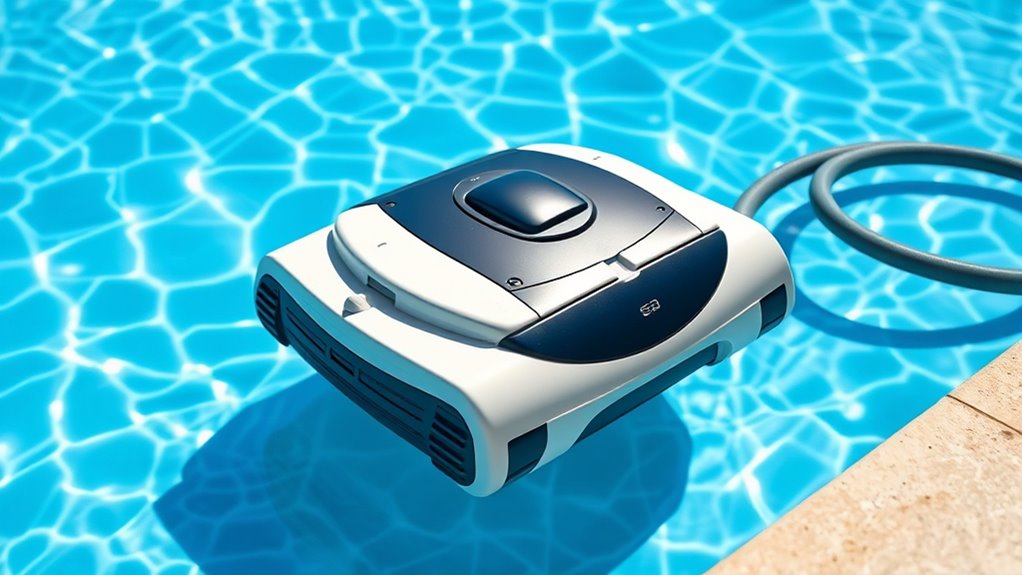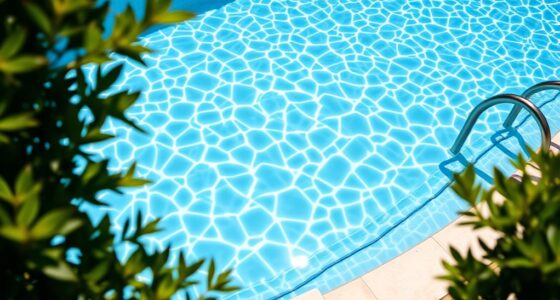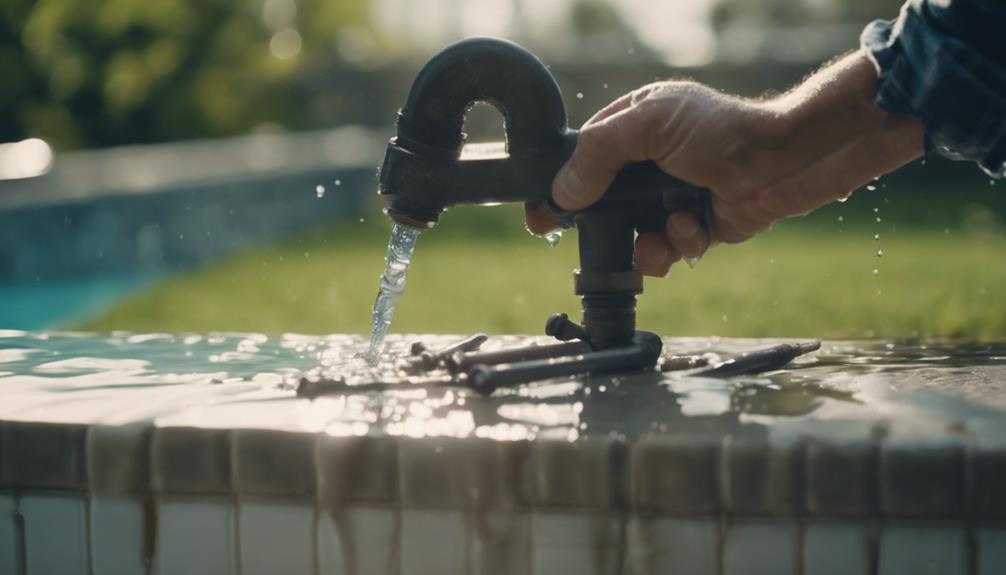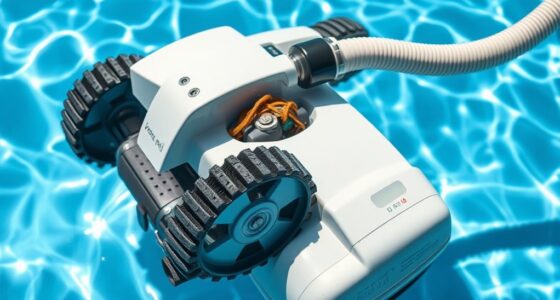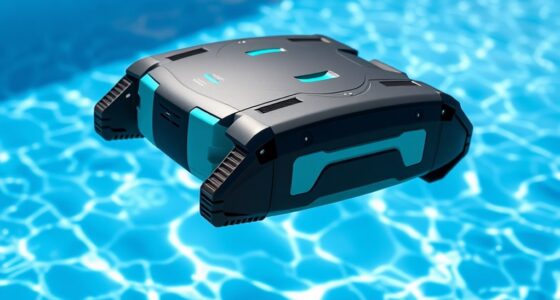Automatic pool cleaners usually last between three and five years, depending on how often you use and maintain them. Proper care, like cleaning filters, inspecting hoses, and storing them properly, can extend their lifespan. Signs they might be nearing the end include reduced cleaning performance and motor issues. To keep your cleaner working well longer, follow best maintenance tips. If you’d like to learn how to maximize their durability, you’ll find helpful advice ahead.
Key Takeaways
- Most automatic pool cleaners last between 3 to 5 years with proper maintenance.
- Durability depends on factors like usage frequency, pool size, debris load, and build quality.
- Regular cleaning, proper storage, and timely replacement of worn parts extend lifespan.
- Signs of nearing end of life include reduced suction, missed spots, and motor or brush wear.
- Choosing reputable brands and maintaining the cleaner properly can maximize its service life.
Typical Lifespan of Automatic Pool Cleaners
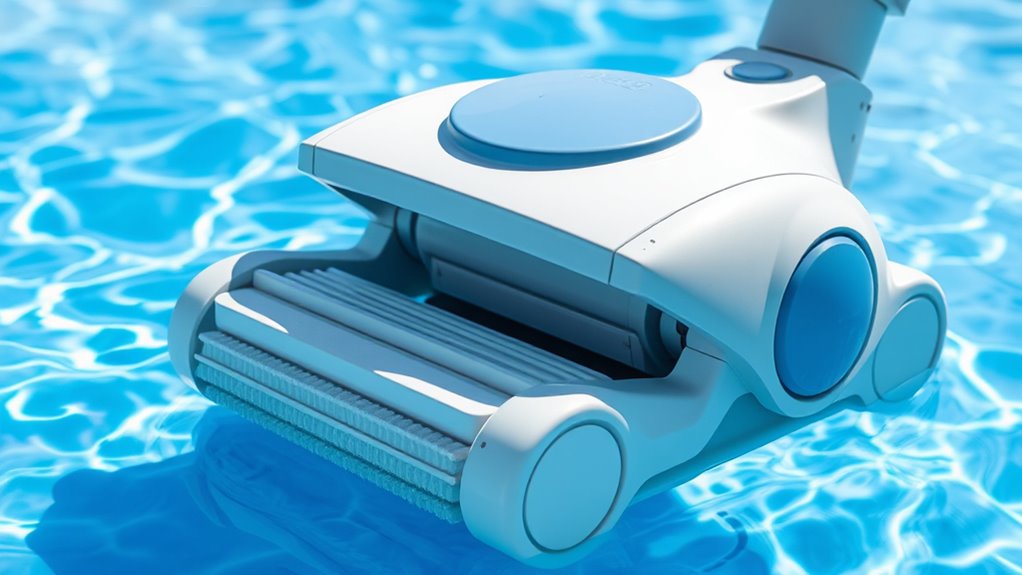
The typical lifespan of an automatic pool cleaner usually ranges from three to five years, depending on how often you use it and how well you maintain it. Different pool cleaner models offer varying durability, but most are designed to last several seasons with proper care. When choosing a model, check the warranty coverage, as it can give you insight into the manufacturer’s confidence in its durability. A longer warranty often indicates a higher-quality product and provides peace of mind against early failures. Regular maintenance, like cleaning filters and inspecting parts, can extend your cleaner’s lifespan beyond the average. Additionally, understanding the juice extraction techniques involved in maintaining your cleaning equipment can help ensure optimal performance. Proper storage and avoiding exposure to harsh weather conditions can also prevent damage and prolong the life of your cleaner. Regularly inspecting the power connections and ensuring they are secure can prevent electrical issues that might shorten its lifespan. Remember, investing in a reputable model with solid warranty coverage can save you money and hassle in the long run.
Factors That Affect Durability and Longevity
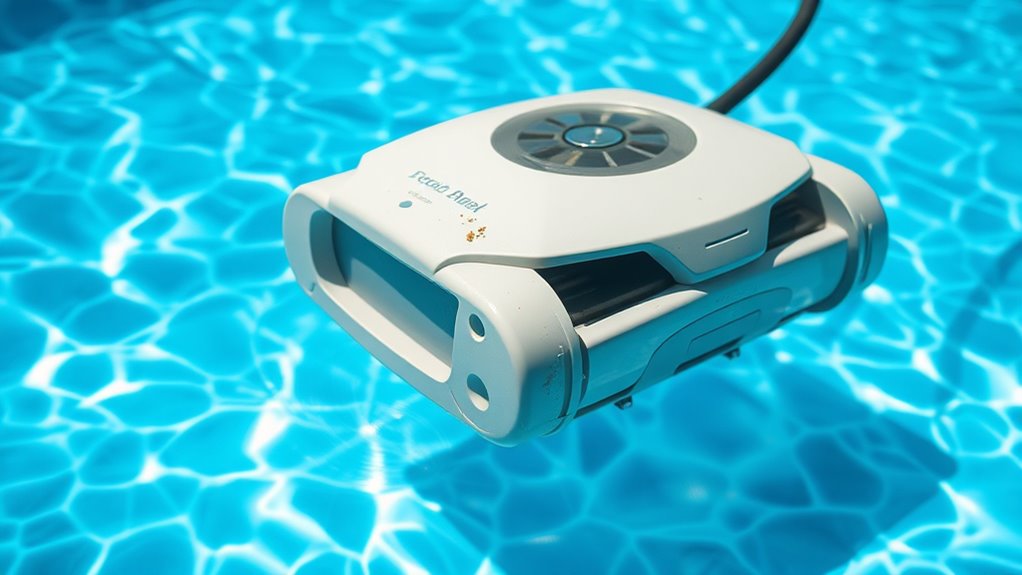
Several key factors influence how long your automatic pool cleaner lasts, from the quality of its parts to how often you use and maintain it. Your pool size plays a role—larger pools require more cleaning, which can wear out the cleaner faster. Additionally, debris types profoundly impact durability; heavy or sharp debris like twigs or leaves can cause damage or clogging, reducing lifespan. Regular maintenance, such as cleaning filters and inspecting parts, helps extend its life. If you neglect these tasks, the cleaner’s components may wear prematurely. Using the right cleaner for your pool size and debris load ensures better longevity. Properly selecting pool cleaning equipment based on your needs can significantly enhance its durability. Moreover, understanding the specific technologies used in different models can help you choose a more durable option. Being aware of the manufacturing quality of your cleaner can also influence its overall lifespan. Overall, understanding these factors helps you make smarter choices to maximize your cleaner’s durability and get the most out of your investment.
Signs Your Pool Cleaner May Be Nearing the End of Its Life
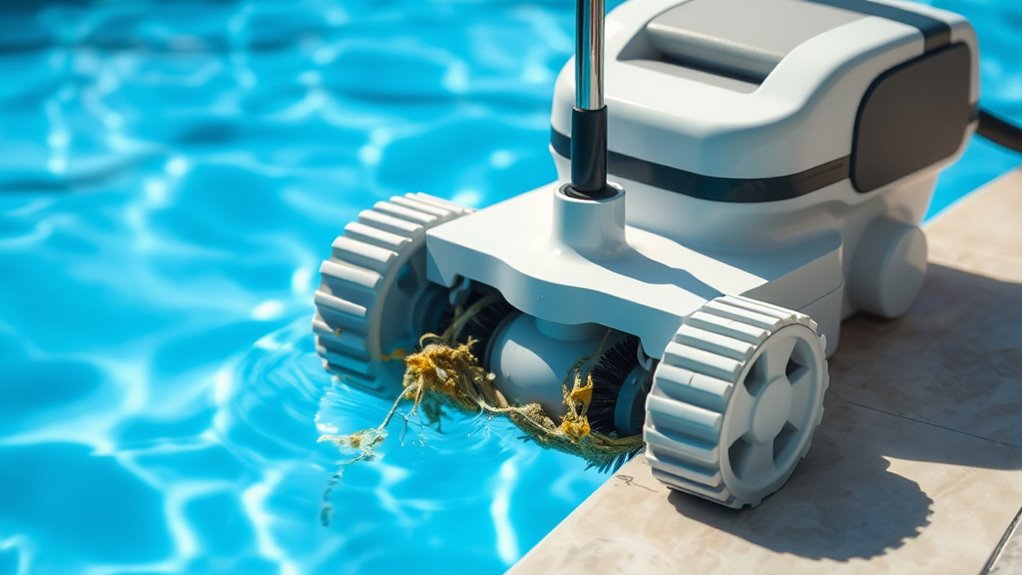
As your pool cleaner ages, you might notice it isn’t performing as effectively as it once did. If it struggles to clean your pool efficiently, it could be a sign it’s nearing the end of its life. Larger pool sizes demand more power and durability, so if your cleaner is losing suction or missing spots, it might not be strong enough anymore. Similarly, if the debris type has shifted to heavier leaves or larger dirt particles, and your cleaner can’t handle them, it’s a clear sign it’s worn out. You might also notice longer cleaning cycles or frequent breakdowns. These issues indicate that your pool cleaner’s motor or brushes are losing their effectiveness, signaling it’s time to contemplate repairs or replacement.
Tips for Extending the Life of Your Pool Cleaner
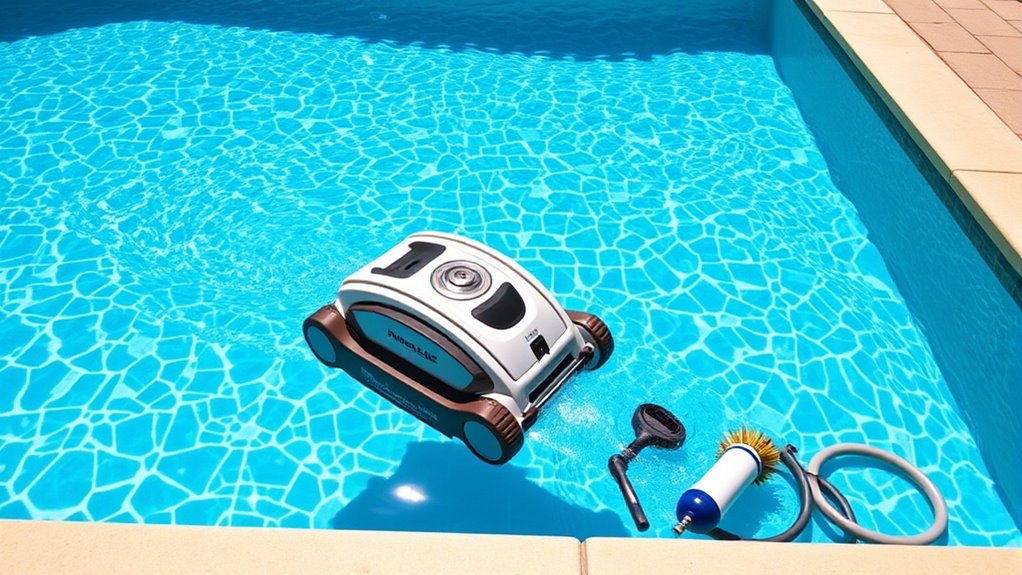
To get the most out of your pool cleaner, regular maintenance is essential. Keep your pool’s chemical balance in check, as proper chemical levels prevent buildup that can strain the cleaner’s parts. Clean the filter regularly to ensure ideal suction and prevent motor burnout. Using a solar cover can reduce debris and algae, easing the cleaner’s workload and extending its lifespan. Remove the cleaner from the pool when not in use, especially during heavy storms or if the pool is not in use for long periods. Inspect hoses and brushes for wear and tear, replacing parts as needed. Proper storage in a dry, shaded area also prevents unnecessary damage and prolongs its life. Additionally, monitoring the debris accumulation can help prevent clogging and maintain optimal performance. Proper upkeep helps your cleaner run smoothly and last longer.
When to Repair or Replace Your Automatic Pool Cleaner
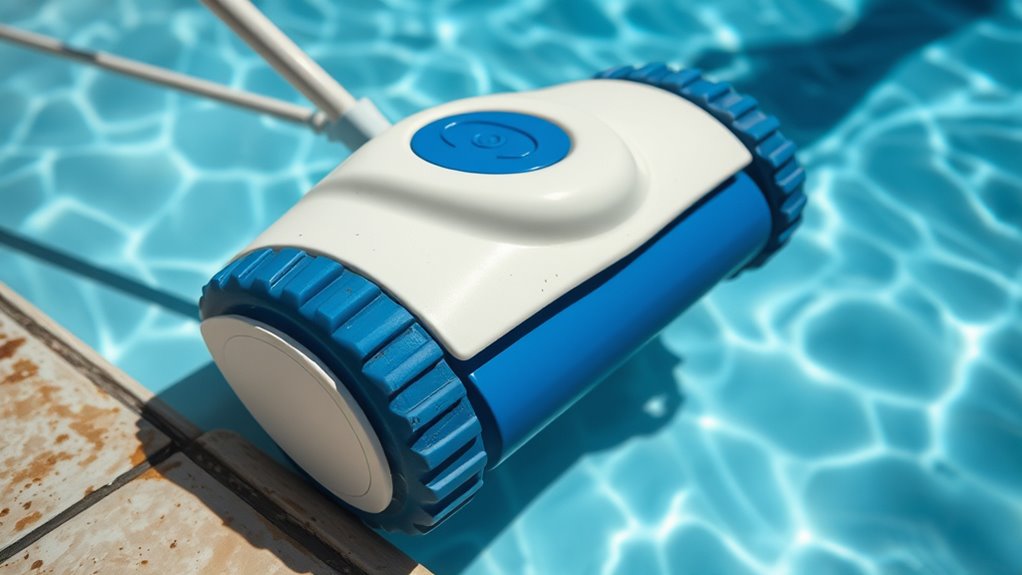
Knowing when to repair or replace your automatic pool cleaner can save you time and money. If you notice persistent issues like poor cleaning performance despite proper maintenance, it’s time to contemplate repairs. Signs like declining energy efficiency or frequent breakdowns often indicate it’s more cost-effective to replace the unit. Additionally, if your cleaner struggles with maintaining proper pool chemical balance, it may be nearing the end of its lifespan. Use this table to evaluate:
| Issue | Repair Possibility | Replacement Needed |
|---|---|---|
| Poor cleaning | Yes, minor repairs | No, upgrade recommended |
| Excessive energy use | Possible repairs | Yes, energy-efficient model |
| Mechanical failure | Sometimes repairable | Often replacement |
| Outdated technology | No | Yes, for better performance |
Stay attentive to these signs to make informed decisions. Regular maintenance and understanding equipment lifespan can help extend the life of your pool cleaner and ensure optimal performance. Additionally, understanding proper storage can prevent premature wear and tear, ultimately prolonging the life of your device. Proper storage protects the equipment from environmental damage and can significantly enhance its durability. Being aware of common issues can further assist in timely repairs, saving costs over time. Regularly inspecting your cleaner for wear and tear can also help catch problems early before they require costly repairs.
Choosing a Durable and Long-Lasting Pool Cleaning System

To guarantee your pool cleaner lasts, focus on the quality of its components, as sturdier parts resist wear better over time. Proper maintenance, like regular cleaning and inspections, can prevent early breakdowns, while understanding your usage habits helps you choose a system suited to your pool’s conditions. By considering these factors, you can select a cleaning system built to stand the test of time. Additionally, choosing a system with Mazda Tuning features can ensure better durability and performance in demanding environments. Ensuring your system has a high-quality refrigerant management system can further prolong its lifespan and efficiency. Incorporating Kia Tuning modifications designed for durability can also enhance the longevity of your system’s components. Furthermore, implementing mindfulness techniques during routine maintenance can help maintain focus and reduce errors, extending the overall lifespan of your equipment. Recognizing the importance of automation in business, integrating reliable features can contribute to more consistent performance over time.
Quality of Components
Choosing a pool cleaner with high-quality components is essential if you want it to last. Durable parts resist wear and tear, ensuring your investment pays off. Look for models with sturdy brushes, reliable motors, and corrosion-resistant materials. Consider how the cleaner handles pool chemical compatibility to prevent damage over time. Proper pool cleaner storage also extends its lifespan by protecting parts from the elements. When components are built to last, you reduce frequent replacements and maintenance hassles. Additionally, selecting a model with trusted brand reputation can guarantee better quality and support over time. Being aware of common wear points can help you identify signs that your cleaner may need servicing or replacement before major issues develop. Understanding family influence on product design can also guide you toward more resilient and user-friendly options.
Proper Maintenance Practices
Maintaining your pool cleaner properly is key to ensuring it stays durable and performs reliably over time. Regularly check and balance your pool chemistry to prevent buildup and corrosion that can damage components. Keep the filter clean and replace it as needed to maintain ideal suction and cleaning efficiency. Proper maintenance also involves inspecting hoses and brushes for wear and tear, replacing parts when necessary. An energy-efficient system not only saves you money but also reduces strain on your cleaner, extending its lifespan. Store your cleaner in a shaded, dry area when not in use to protect it from sun damage and moisture. Consistently following these practices helps your pool cleaner last longer, ensuring you get the most value and performance from your investment.
Usage Frequency and Conditions
Since frequent use can wear down components faster, it’s essential to select a pool cleaning system designed for your specific needs and usage conditions. If you have a large pool, you’ll need a durable cleaner that can handle extended operation without overheating or breaking down. Consider your pool size and debris accumulation—if your pool collects leaves, dirt, or algae often, choose a cleaner with robust brushes and filters. High usage demands a system built for longevity, so look for models rated for frequent use and tough conditions. Properly matching your cleaner’s capabilities to your pool’s size and debris levels helps prevent unnecessary wear and extends its lifespan. This guarantees your investment lasts longer and maintains ideal cleaning performance.
Frequently Asked Questions
What Is the Average Lifespan of Robotic Versus Suction-Side Pool Cleaners?
When comparing robotic and suction-side pool cleaners, you’ll notice differences in device durability and lifespan. Robotic cleaners typically last around 3 to 5 years due to their advanced technology, while suction-side models often last 5 to 8 years with proper maintenance. Your choice depends on how much you value long-term pool cleaning efficiency and device robustness. Regular upkeep ensures you get the most out of your investment, no matter which type you choose.
How Do Environmental Factors Influence the Longevity of Pool Cleaners?
They say “prevention is better than cure,” and environmental factors truly test your pool cleaner’s durability. Exposure to harsh chemicals can cause chemical corrosion, while UV degradation from sunlight weakens plastic parts. To extend your cleaner’s lifespan, regularly rinse it, store it in a shaded area, and avoid harsh chemicals. Proper care helps your cleaner resist these elements and keeps it running smoothly longer.
Are There Specific Brands Known for Longer-Lasting Automatic Pool Cleaners?
You’ll find that some brands have a reputation for durability, making them a smart choice if you want your automatic pool cleaner to last longer. Brands like Dolphin and Polaris are known for their quality and reliability, often offering better longevity. While they might cost a bit more upfront, their cost comparison shows they tend to save you money over time through fewer repairs and replacements, providing better value overall.
Can Regular Maintenance Significantly Extend My Pool Cleaner’S Lifespan?
Regular maintenance can definitely extend your pool cleaner’s lifespan. By keeping up with pool filter maintenance, you prevent debris from clogging the cleaner’s components, and replacing batteries when needed guarantees it runs efficiently. Consistently checking for wear and tear, cleaning brushes, and timely battery replacement help your cleaner stay in top shape longer, saving you money and effort in the long run. Proper care truly makes a difference.
What Are the Most Common Reasons Automatic Pool Cleaners Fail Prematurely?
You wonder why your automatic pool cleaner fails prematurely. Common component failures include worn brushes, clogged filters, and broken belts. Sometimes, user handling mistakes, like improper storage or ignoring maintenance, accelerate these issues. While quality matters, neglecting regular upkeep often causes early breakdowns. By avoiding these mistakes and inspecting parts regularly, you can prolong your cleaner’s life and ensure it keeps your pool spotless longer.
Conclusion
With proper care, your automatic pool cleaner can serve you well for several seasons, like a loyal guardian patrolling your sparkling oasis. Keep an eye out for signs it’s nearing the end—like a fading whisper of its once-robust performance. Regular maintenance and timely replacements will guarantee your cleaner continues to glide smoothly across your pool’s surface, turning routine chores into a seamless, almost effortless part of enjoying your backyard paradise.

